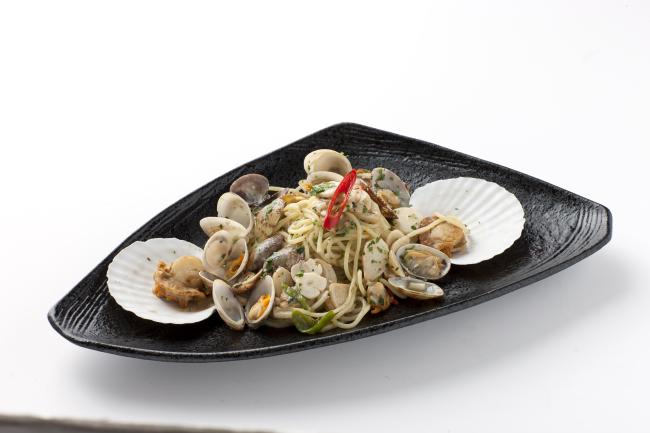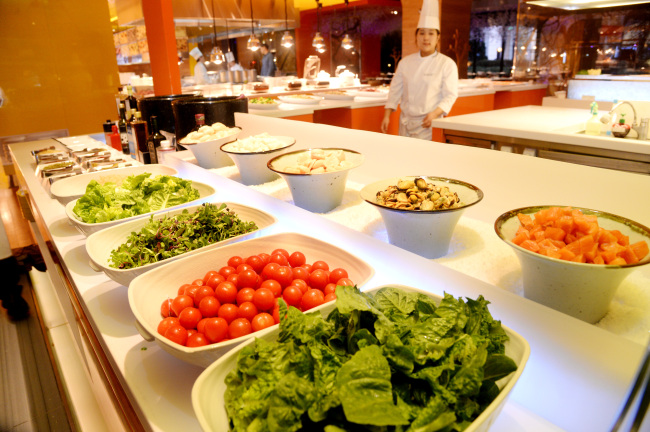“Superfood” is not a scientific term. It is a marketing term for nutrient-rich food and a growing number of food-makers and restaurants are adopting the word in their sales and marketing strategies.
Korea’s top hotel restaurants and food franchises agree that true superfoods share something more than just nutrition.
While this year’s superfoods are not necessarily “better” than those of a decade ago, they are seasonal, fresh, and preferably grown locally.
Locally grown fresh seaweed and shellfish are dominant in this winter’s superfood trends at leading hotel groups and restaurant chains.
Seaweed and marine algae have more concentrated nutrition than vegetables grown on land, according to nutritionists. In Korean waters, seaweed and shellfish are deemed most nutritious in winter.
Starting in December, Lotte Hotel Seoul added a seafood Caesar salad section to its seasonal salad bar of in-house French restaurant La Seine, seeking a healthy tweak to the traditional grilled chicken Caesar salad. Customers can create their own Caesar salad from five choices of fresh seafood ― mussels, scallops, shrimp, calamari and fresh salmon ― nuts and locally grown vegetables.
Korea’s top hotel restaurants and food franchises agree that true superfoods share something more than just nutrition.
While this year’s superfoods are not necessarily “better” than those of a decade ago, they are seasonal, fresh, and preferably grown locally.
Locally grown fresh seaweed and shellfish are dominant in this winter’s superfood trends at leading hotel groups and restaurant chains.
Seaweed and marine algae have more concentrated nutrition than vegetables grown on land, according to nutritionists. In Korean waters, seaweed and shellfish are deemed most nutritious in winter.
Starting in December, Lotte Hotel Seoul added a seafood Caesar salad section to its seasonal salad bar of in-house French restaurant La Seine, seeking a healthy tweak to the traditional grilled chicken Caesar salad. Customers can create their own Caesar salad from five choices of fresh seafood ― mussels, scallops, shrimp, calamari and fresh salmon ― nuts and locally grown vegetables.

“In principle, we periodically change the list of assorted vegetables in our salad bar to offer seasonal ingredients to the customers,” said a Lotte Hotel representative.
Salmon is a great source of high-quality protein and omega-3 fatty acids. One-hundred grams of mussels provides around 13 percent of your daily vitamin C needs and 22 percent of your iron needs. Mussels are also good sources of other B vitamins (particularly folic acid), phosphorus, manganese, zinc and omega-3 fatty acids.
From Feb. 1 to 23, Hanazono, the Japanese restaurant at the Ritz-Carlton Seoul, will launch a limited winter seafood course, with oysters, cockles and other shellfish.
“The new seasonal course menu includes snow crabs, cockles, sea urchin roe and oysters, which taste the best in winter,” a Ritz-Carlton spokesperson said.
Oysters, nicknamed “the milk from the ocean,” are naturally rich in essential vitamins and minerals, including protein, iron, omega-3 fatty acids, calcium, zinc, and vitamin C.
Seasonal Table, a Korean restaurant run by CJ Foodville, launched new winter dishes in November, including egg-fried cakes of mussels and “maesaengi,” a silky, thread-type alkaline seaweed. Freshly grown in the clean waters off South Jeolla Province, maesaengi is a superb source of iodine, calcium, magnesium, iron, vitamins C and A, protein, vitamin B and fiber.

“This winter, the ingredients for the new seasonal menu were supplied directly through local channels,” a spokesperson of CJ Foodville said.
Starting in January, Seasonal Table will also introduce another sea novelty, bibimbap with “ggosiraegi,” a seaweed nicknamed “seastring.” Ggosiraegi is a chewy seaweed that is grown in Jangheung, South Jeolla Province, by a man named Jang Dong-ik.
Maesaengi is also used in the winter-only menu of La Grillia, a restaurant franchise run by SPC Group. The Italian bistro serves maesaengi oyster cream risotto from December to early February. Another special winter dish is spicy pasta with scallops in the shell.
By Chung Joo-won (joowonc@heraldcorp.com)



![[Herald Interview] 'Amid aging population, Korea to invite more young professionals from overseas'](http://res.heraldm.com/phpwas/restmb_idxmake.php?idx=644&simg=/content/image/2024/04/24/20240424050844_0.jpg&u=20240424200058)













![[KH Explains] Korean shipbuilding stocks rally: Real growth or bubble?](http://res.heraldm.com/phpwas/restmb_idxmake.php?idx=652&simg=/content/image/2024/04/25/20240425050656_0.jpg&u=)

